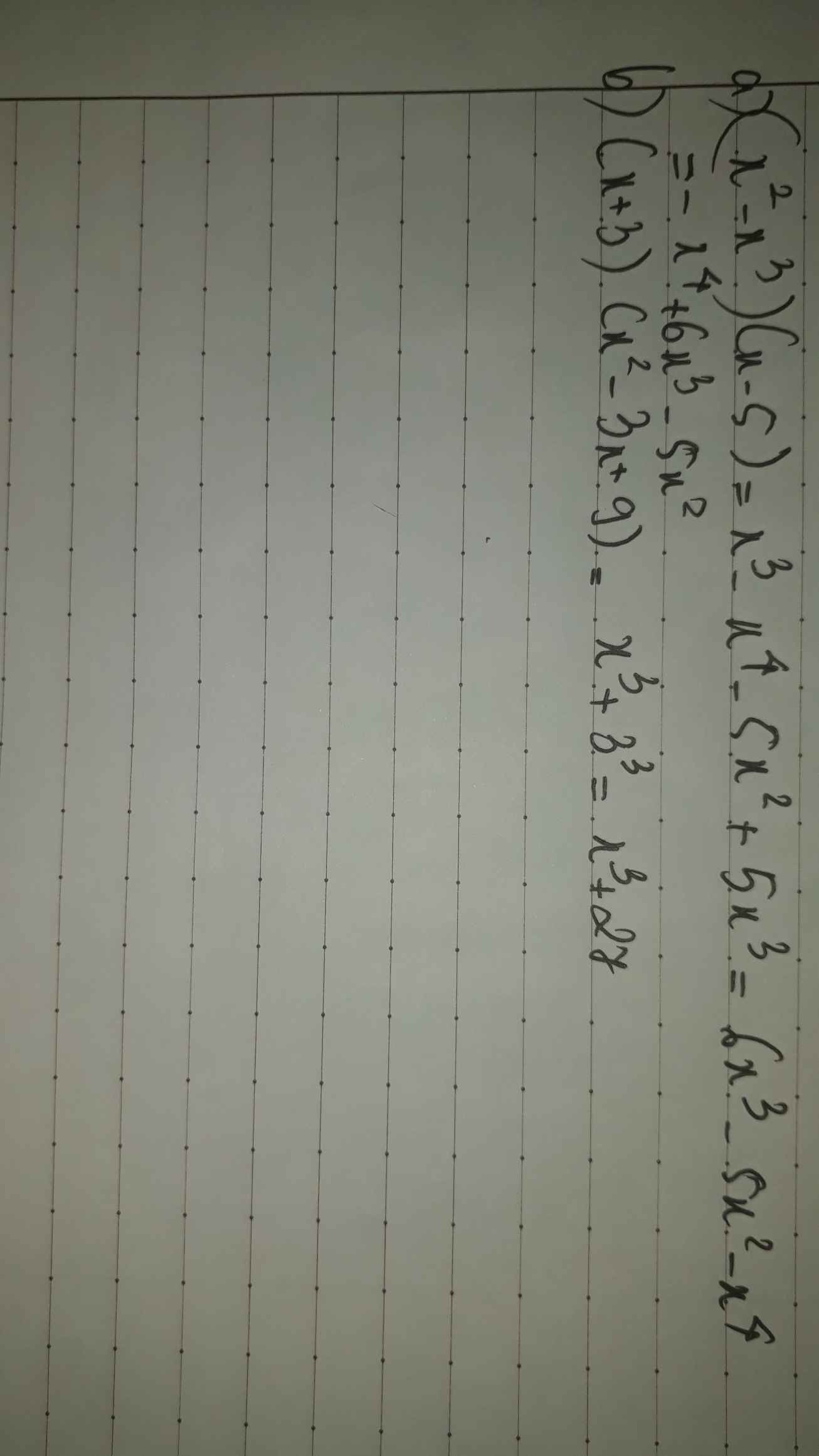

\(\left(x^2-x^3\right).\left(x-5\right)\)
<...">Hãy nhập câu hỏi của bạn vào đây, nếu là tài khoản VIP, bạn sẽ được ưu tiên trả lời.



Làm tiếp nè :
2) / 2x + 4/ = 2x - 5
Do : / 2x + 4 / ≥ 0 ∀x
⇒ 2x - 5 ≥ 0
⇔ x ≥ \(\dfrac{5}{2}\)
Bình phương hai vế của phương trình , ta có :
( 2x + 4)2 = ( 2x - 5)2
⇔ ( 2x + 4)2 - ( 2x - 5)2 = 0
⇔ ( 2x + 4 - 2x + 5)( 2x + 4 + 2x - 5) = 0
⇔ 9( 4x - 1) = 0
⇔ x = \(\dfrac{1}{4}\) ( KTM)
Vậy , phương trình vô nghiệm .
3) / x + 3/ = 3x - 1
Do : / x + 3 / ≥ 0 ∀x
⇒ 3x - 1 ≥ 0
⇔ x ≥ \(\dfrac{1}{3}\)
Bình phương hai vế của phương trình , ta có :
( x + 3)2 = ( 3x - 1)2
⇔ ( x + 3)2 - ( 3x - 1)2 = 0
⇔ ( x + 3 - 3x + 1)( x + 3 + 3x - 1) = 0
⇔ ( 4 - 2x)( 4x + 2) = 0
⇔ x = 2 (TM) hoặc x = \(\dfrac{-1}{2}\) ( KTM)
KL......
4) / x - 4/ + 3x = 5
⇔ / x - 4/ = 5 - 3x
Do : / x - 4/ ≥ 0 ∀x
⇒ 5 - 3x ≥ 0
⇔ x ≤ \(\dfrac{-5}{3}\)
Bình phương cả hai vế của phương trình , ta có :
( x - 4)2 = ( 5 - 3x)2
⇔ ( x - 4)2 - ( 5 - 3x)2 = 0
⇔ ( x - 4 - 5 + 3x)( x - 4 + 5 - 3x) = 0
⇔ ( 4x - 9)( 1 - 2x) = 0
⇔ x = \(\dfrac{9}{4}\) ( KTM) hoặc x = \(\dfrac{1}{2}\) ( KTM)
KL......
Làm tương tự với các phần khác nha
1)\(\left|4x\right|=3x+12\)
\(\Leftrightarrow4.\left|x\right|=3x+12\\ \Leftrightarrow4.\left|x\right|-3x=12\)
\(TH1:4x-3x=12\left(x\ge0\right)\\\Leftrightarrow x=12\left(TM\right) \)
\(TH2:4.\left(-x\right)-3x=12\left(x< 0\right)\\ \Leftrightarrow-7x=12\\ \Leftrightarrow x=-\dfrac{12}{7}\left(TM\right)\)
Vậy tập nghiệm của PT: \(S=\left\{12;-\dfrac{12}{7}\right\}\)

2: Ta có: |x-1|+|x-2|=5(1)
Trường hợp 1: x<1
(1) trở thành 1-x+2-x=5
=>-2x+3=5
=>-2x=2
hay x=-1(nhận)
Trường hợp 2: 1<=x<2
(1) trở thành x-1+2-x=5
=>1=5(vô lý)
Trường hợp 3: x>=2
(1) trở thành x-1+x-2=5
=>2x-3=5
hay x=4(nhận)
3: |x-3|+|x+1|=10(2)
Trường hợp 1: x<-1
(2) trở thành -x-1+3-x=10
=>-2x+2=10
=>-2x=8
hay x=-4(nhận)
Trường hợp 2: -1<=x<3
(2) trở thành x+1+3-x=10
=>4=10(vô lý)
Trường hợp 3: x>=3
(2) trở thành x-3+x+1=10
=>2x-2=10
hay x=6(nhận)

Bài 1:
\((1-2x)^2=9=3^2=(-3)^2\)
\(\Rightarrow \left[\begin{matrix} 1-2x=3\\ 1-2x=-3\end{matrix}\right.\Rightarrow \left[\begin{matrix} x=-1\\ x=2\end{matrix}\right.\)
Bài 2:
\((x+5)^3=-64=(-4)^3\)
\(\Rightarrow x+5=-4\Rightarrow x=-9\)
Bài 3:
\((3x-5)^2=16=4^2=(-4)^2\)
\(\Rightarrow \left[\begin{matrix} 3x-5=4\\ 3x-5=-4\end{matrix}\right.\Rightarrow \left[\begin{matrix} x=3\\ x=\frac{1}{3}\end{matrix}\right.\)
Bài 4:
\((x-1)^3=27=3^3\)
\(\Rightarrow x-1=3\Rightarrow x=4\)
Bài 5:
\(x^2+x=0\Leftrightarrow x(x+1)=0\)
\(\Rightarrow \left[\begin{matrix} x=0\\ x+1=0\end{matrix}\right.\Rightarrow \left[\begin{matrix} x=0\\ x=-1\end{matrix}\right.\)
Bài 6:
\(5^{x+2}=625=5^4\)
\(\Rightarrow x+2=4\Rightarrow x=2\)

Mấy câu này dễ mà,động não lên chứ bạn:v
Link______________Link
h) \(\left|x-1\right|+\left|x-3\right|=\left|x-1\right|+\left|3-x\right|\)
\(\ge\left|x-1+3-x\right|=2\)
\(\Rightarrow x+1>2\Leftrightarrow x>1\)
Vậy: \(\left\{{}\begin{matrix}x>1\\x\in R\end{matrix}\right.\)
Câu b xét khoảng tương tự với cái link t đưa thôi
hơi bức xúc rồi đó
tau chỉ muốn kiểm tra lại thôi

\(\left(3x-1\right)^2+2\left(9x^2-1\right)+\left(3x+1\right)^2\)
\(=9x^2-6x+1+18x^2+2+9x^2+6x+1\)
\(=36x^2+4\)
\(\left(x^2-1\right)\left(x+3\right)-\left(x-3\right)\left(x^3+3x+9\right)\)
\(=x^3+3x^2-x+3-\left(x^4+3x^2+9x-3x^3-9x-27\right)\)
\(=x^3+3x^2-x+3-x^4-3x^2-9x+3x^3+9x-27\)
\(=\left(3x^2-3x^2\right)+\left(9x-9x\right)-x-\left(27-3\right)+x^3-x^4+3x^3\)
\(=-x-24+x^3-x^4+3x^3\)
\(\left(x+4\right)\left(x-4\right)-\left(x-4\right)^2\)
\(=x^2-16-\left(x-4\right)^2\)
\(=x^2-16-x^2+8x-16\)
\(=8x-32\)

1: =>3x+2=x+1 hoặc 3x+2=-x-1
=>2x=-1 hoặc 4x=-3
=>x=-1/2 hoặc x=-3/4
2: =>|x+2|(|x|-1|)=0
=>x=-2; x=1; x=-1
3: \(\Leftrightarrow\left\{{}\begin{matrix}x>=-1\\\left(2x+3+x+1\right)\left(2x+3-x-1\right)=0\end{matrix}\right.\)
\(\Leftrightarrow\left\{{}\begin{matrix}x>=-1\\\left(3x+4\right)\left(x+2\right)=0\end{matrix}\right.\Leftrightarrow x\in\varnothing\)